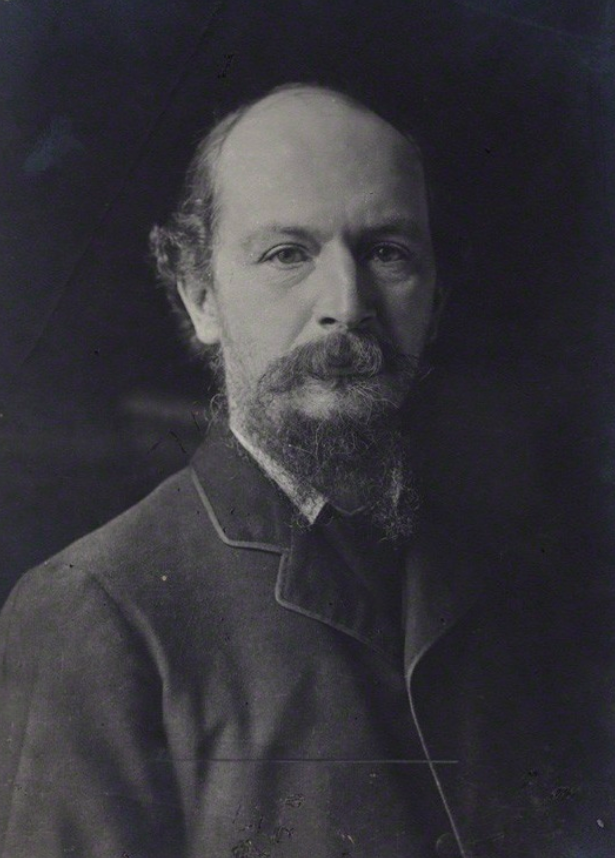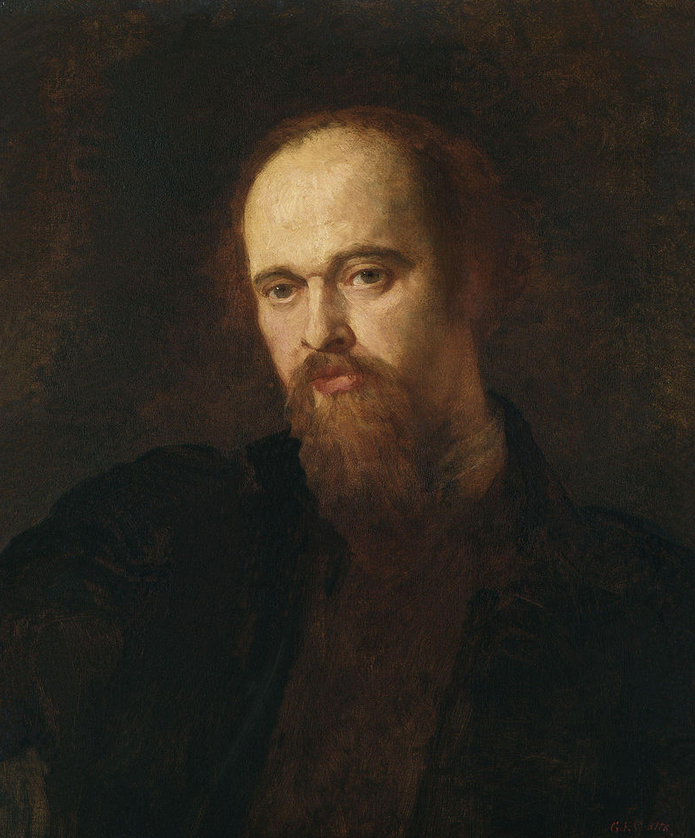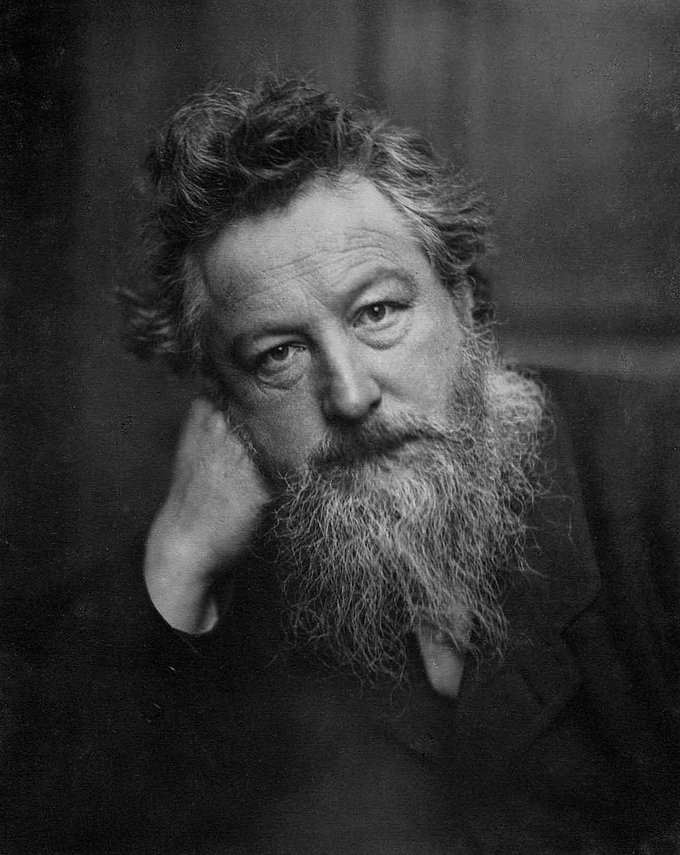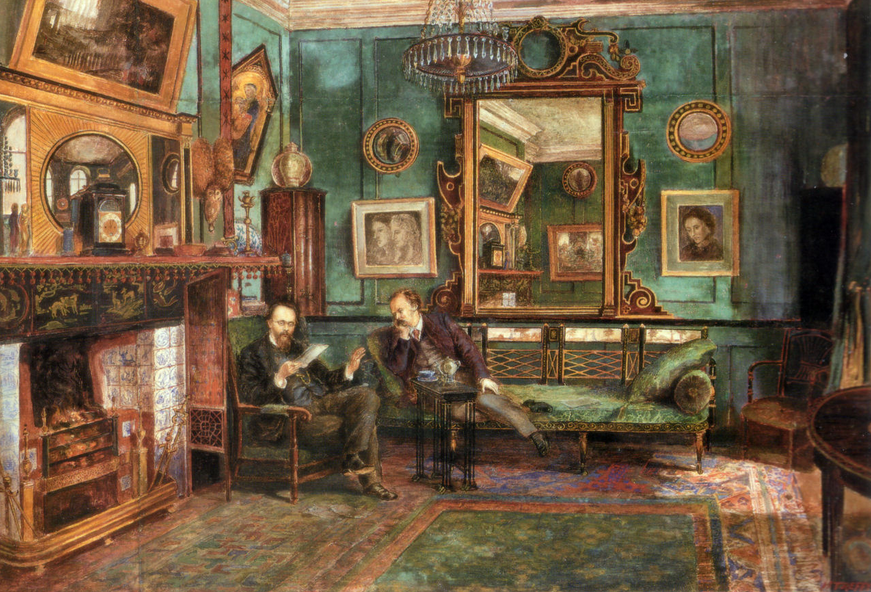Editor’s note: The following is extracted from The Victorian Age in Literature, by G. K. Chesterton (published 1913). All spelling in the original.
(Continued from Part 1)
It is natural, in the matter of Victorian moral change, to take Swinburne as the next name here. He is the only poet who was also, in the European sense, on the spot; even if, in the sense of the Gilbertian song, the spot was barred. He also knew that something rather crucial was happening to Christendom; he thought it was getting unchristened. It is even a little amusing, indeed, that these two Pro-Italian poets almost conducted a political correspondence in rhyme. Mrs. Browning sternly reproached those who had ever doubted the good faith of the King of Sardinia, whom she acclaimed as being truly a king. Swinburne, lyrically alluding to her as “Sea-eagle of English feather,” broadly hinted that the chief blunder of that wild fowl had been her support of an autocratic adventurer: “calling a crowned man royal, that was no more than a king.” But it is not fair, even in this important connection, to judge Swinburne by Songs Before Sunrise. They were songs before a sunrise that has never turned up. Their dogmatic assertions have for a long time past stared starkly at us as nonsense. As, for instance, the phrase “Glory to Man in the Highest, for man is the master of things”; after which there is evidently nothing to be said, except that it is not true. But even where Swinburne had his greater grip, as in that grave and partly just poem Before a Crucifix, Swinburne, the most Latin, the most learned, the most largely travelled of the Victorians, still knows far less of the facts than even Mrs. Browning. The whole of the poem, Before a Crucifix, breaks down by one mere mistake. It imagines that the French or Italian peasants who fell on their knees before the Crucifix did so because they were slaves. They fell on their knees because they were free men, probably owning their own farms. Swinburne could have found round about Putney plenty of slaves who had no crucifixes: but only crucifixions.

When we come to ethics and philosophy, doubtless we find Swinburne in full revolt, not only against the temperate idealism of Tennyson, but against the genuine piety and moral enthusiasm of people like Mrs. Browning. But here again Swinburne is very English, nay, he is very Victorian, for his revolt is illogical. For the purposes of intelligent insurrection against priests and kings, Swinburne ought to have described the natural life of man, free and beautiful, and proved from this both the noxiousness and the needlessness of such chains. Unfortunately Swinburne rebelled against Nature first and then tried to rebel against religion for doing exactly the same thing that he had done. His songs of joy are not really immoral; but his songs of sorrow are. But when he merely hurls at the priest the assertion that flesh is grass and life is sorrow, he really lays himself open to the restrained answer, “So I have ventured, on various occasions, to remark.” When he went forth, as it were, as the champion of pagan change and pleasure, he heard uplifted the grand choruses of his own Atalanta, in his rear, refusing hope.
The splendid diction that blazes through the whole of that drama, that still dances exquisitely in the more lyrical Poems and Ballads, makes some marvellous appear ances in Songs Before Sunrise, and then mainly falters and fades away, is, of course, the chief thing about Swinburne. The style is the man; and some will add that it does not, thus unsupported, amount to much of a man. But the style itself suffers some injustice from those who would speak thus. The views expressed are often quite foolish and often quite insincere; but the style itself is a manlier and more natural thing than is commonly made out. It is not in the least languorous or luxurious or merely musical and sensuous, as one would gather from both the eulogies and the satires, from the conscious and the unconscious imitations. On the contrary, it is a sort of fighting and profane parody of the Old Testament; and its lines are made of short English words like the short Roman swords. The first line of one of his finest poems, for instance, runs, “I have lived long enough to have seen one thing, that love hath an end.” In that sentence only one small “e” gets outside the monosyllable. Through all his interminable tragedies, he was fondest of lines like—
“If ever I leave off to honour you
God give me shame; I were the worst churl born.”
The dramas were far from being short and dramatic; but the words really were. Nor was his verse merely smooth; except his very bad verse, like “the lilies and languors of virtue, to the raptures and roses of vice,” which both, in cheapness of form and foolishness of sentiment, may be called the worst couplet in the world’s literature. In his real poetry (even in the same poem) his rhythm and rhyme are as original and ambitious as Browning; and the only difference between him and Browning is, not that he is smooth and without ridges, but that he always crests the ridge triumphantly and Browning often does not—
“On thy bosom though many a kiss be,
There are none such as knew it of old.
Was it Alciphron once or Arisbe,
Male ringlets or feminine gold,
That thy lips met with under the statue
Whence a look shot out sharp after thieves
From the eyes of the garden-god at you
Across the fig-leaves.”
Look at the rhymes in that verse, and you will see they are as stiff a task as Browning’s: only they are successful. That is the real strength of Swinburne—a style. It was a style that nobody could really imitate; and least of all Swinburne himself, though he made the attempt all through his later years. He was, if ever there was one, an inspired poet. I do not think it the highest sort of poet. And you never discover who is an inspired poet until the inspiration goes.
With Swinburne we step into the circle of that later Victorian influence which was very vaguely called Æsthetic. Like all human things, but especially Victorian things, it was not only complex but confused. Things in it that were at one on the emotional side were flatly at war on the intellectual. In the section of the painters, it was the allies or pupils of Ruskin, pious, almost painfully exact, and copying mediæval details rather for their truth than their beauty. In the section of the poets it was pretty loose, Swinburne being the leader of the revels. But there was one great man who was in both sections, a painter and a poet, who may be said to bestride the chasm like a giant. It is in an odd and literal sense true that the name of Rossetti is important here, for the name implies the nationality. I have loosely called Carlyle and the Brontës the romance from the North; the nearest to a general definition of the Æsthetic movement is to call it the romance from the South. It is that warm wind that had never blown so strong since Chaucer, standing in his cold English April, had smelt the spring in Provence. The Englishman has always found it easier to get inspiration from the Italians than from the French; they call to each other across that unconquered castle of reason. Browning’s Englishman in Italy, Browning’s Italian in England, were both happier than either would have been in France. Rossetti was the Italian in England, as Browning was the Englishman in Italy; and the first broad fact about the artistic revolution Rossetti wrought is written when we have written his name. But if the South lets in warmth or heat, it also lets in hardness. The more the orange tree is luxuriant in growth, the less it is loose in outline. And it is exactly where the sea is slightly warmer than marble that it looks slightly harder. This, I think, is the one universal power behind the Æsthetic and Pre-Raphaelite movements, which all agreed in two things at least: strictness in the line and strength, nay violence, in the colour.

Rossetti was a remarkable man in more ways than one; he did not succeed in any art; if he had he would probably never have been heard of. It was his happy knack of half failing in both the arts that has made him a success. If he had been as good a poet as Tennyson, he would have been a poet who painted pictures. If he had been as good a painter as Burne-Jones, he would have been a painter who wrote poems. It is odd to note on the very threshold of the extreme art movement that this great artist largely succeeded by not defining his art. His poems were too pictorial. His pictures were too poetical. That is why they really conquered the cold satisfaction of the Victorians, because they did mean something, even if it was a small artistic thing.
Rossetti was one with Ruskin, on the one hand, and Swinburne on the other, in reviving the decorative instinct of the Middle Ages. While Ruskin, in letters only, praised that decoration Rossetti and his friends repeated it. They almost made patterns of their poems. That frequent return of the refrain which was foolishly discussed by Professor Nordau was, in Rossetti’s case, of such sadness as sometimes to amount to sameness. The criticism on him, from a mediæval point of view, is not that he insisted on a chorus, but that he could not insist on a jolly chorus. Many of his poems were truly mediæval, but they would have been even more mediæval if he could ever have written such a refrain as “Tally Ho!” or even “Tooral-ooral” instead of “Tall Troy’s on fire.” With Rossetti goes, of course, his sister, a real poet, though she also illustrated that Pre-Raphaelite’s conflict of views that covered their coincidence of taste. Both used the angular outlines, the burning transparencies, the fixed but still unfathomable symbols of the great mediæval civilisation; but Rossetti used the religious imagery (on the whole) irreligiously, Christina Rossetti used it religiously but (on the whole) so to make it seem a narrower religion.
One poet, or, to speak more strictly, one poem, belongs to the same general atmosphere and impulse as Swinburne; the free but languid atmosphere of later Victorian art. But this time the wind blew from hotter and heavier gardens than the gardens of Italy. Edward Fitzgerald, a cultured eccentric, a friend of Tennyson, produced what professed to be a translation of the Persian poet Omar, who wrote quatrains about wine and roses and things in general. Whether the Persian original, in its own Persian way, was greater or less than this version I must not discuss here, and could not discuss anywhere. But it is quite clear that Fitzgerald’s work is much too good to be a good translation. It is as personal and creative a thing as ever was written; and the best expression of a bad mood, a mood that may, for all I know, be permanent in Persia, but was certainly at this time particularly fashionable in England. In the technical sense of literature it is one of the most remarkable achievements of that age; as poetical as Swinburne and far more perfect. In this verbal sense its most arresting quality is a combination of something haunting and harmonious that flows by like a river or a song, with something else that is compact and pregnant like a pithy saying picked out in rock by the chisel of some pagan philosopher. It is at once a tune that escapes and an inscription that remains. Thus, alone among the reckless and romantic verses that first rose in Coleridge or Keats, it preserves something also of the wit and civilisation of the eighteenth century. Lines like “a Muezzin from the tower of darkness cries,” or “Their mouths are stopped with dust” are successful in the same sense as “Pinnacled dim in the intense inane” or “Through verdurous glooms and winding mossy ways.” But—
“Indeed, indeed, repentance oft before
I swore; but was I sober when I swore?”
is equally successful in the same sense as—
“Damn with faint praise, assent with civil leer
And without sneering teach the rest to sneer.”
It thus earned a right to be considered the complete expression of that scepticism and sensual sadness into which later Victorian literature was more and more falling away: a sort of bible of unbelief. For a cold fit had followed the hot fit of Swinburne, which was of a feverish sort: he had set out to break down without having, or even thinking he had, the rudiments of rebuilding in him; and he effected nothing national even in the way of destruction. The Tennysonians still walked past him as primly as a young ladies’ school—the Browningites still inked their eyebrows and minds in looking for the lost syntax of Browning; while Browning himself was away looking for God, rather in the spirit of a truant boy from their school looking for birds’ nests. The nineteenth-century sceptics did not really shake the respectable world and alter it, as the eighteenth-century sceptics had done; but that was because the eighteenth-century sceptics were something more than sceptics, and believed in Greek tragedies, in Roman laws, in the Republic. The Swinburnian sceptics had nothing to fight for but a frame of mind; and when ordinary English people listened to it, they came to the conclusion that it was a frame of mind they would rather hear about than experience. But these later poets did, so to speak, spread their soul in all the empty spaces; weaker brethren, disappointed artists, unattached individuals, very young people, were sapped or swept away by these songs; which, so far as any particular sense in them goes, were almost songs without words. It is because there is something which is after all indescribably manly, intellectual, firm about Fitzgerald’s way of phrasing the pessimism that he towers above the slope that was tumbling down to the decadents. But it is still pessimism, a thing unfit for a white man; a thing like opium, that may often be a poison and sometimes a medicine, but never a food for us, who are driven by an inner command not only to think but to live, not only to live but to grow, and not only to grow but to build.

And, indeed, we see the insufficiency of such sad extremes even in the next name among the major poets; we see the Swinburnian parody of mediævalism, the inverted Catholicism of the decadents, struggling to get back somehow on its feet. The æsthetic school had, not quite unjustly, the name of mere dilettanti. But it is fair to say that in the next of them, a workman and a tradesman, we already feel something of that return to real issues leading up to the real revolts that broke up Victorianism at last. In the mere art of words, indeed, William Morris carried much further than Swinburne or Rossetti the mere imitation of stiff mediæval ornament. The other mediævalists had their modern moments; which were (if they had only known it) much more mediæval than their mediæval moments. Swinburne could write—
“We shall see Buonaparte the bastard
Kick heels with his throat in a rope.”
One has an uneasy feeling that William Morris would have written something like—
“And the kin of the ill king Bonaparte
Hath a high gallows for all his part.”
Rossetti could, for once in a way, write poetry about a real woman and call her “Jenny.” One has a disturbed suspicion that Morris would have called her “Jehanne.”
But all that seems at first more archaic and decorative about Morris really arose from the fact that he was more virile and real than either Swinburne or Rossetti. It arose from the fact that he really was, what he so often called himself, a craftsman. He had enough masculine strength to be tidy: that is, after the masculine manner, tidy about his own trade. If his poems were too like wallpapers, it was because he really could make wall papers. He knew that lines of poetry ought to be in a row, as palings ought to be in a row; and he knew that neither palings nor poetry looks any the worse for being simple or even severe. In a sense Morris was all the more creative because he felt the hard limits of creation as he would have felt them if he were not working in words but in wood; and if he was unduly dominated by the mere conventions of the mediævals, it was largely because they were (whatever else they were) the very finest fraternity of free workmen the world is ever likely to see.
The very things that were urged against Morris are in this sense part of his ethical importance; part of the more promising and wholesome turn he was half unconsciously giving to the movement of modern art. His hazier fellow-Socialists blamed him because he made money; but this was at least in some degree because he made other things to make money: it was part of the real and refreshing fact that at last an æsthete had appeared who could make something. If he was a capitalist, at least he was what later capitalists cannot or will not be—something higher than a capitalist, a tradesman. As compared with aristocrats like Swinburne or aliens like Rossetti, he was vitally English and vitally Victorian. He inherits some of that paradoxical glory which Napoleon gave reluctantly to a nation of shopkeepers. He was the last of that nation; he did not go out golfing: like that founder of the artistic shopman, Samuel Richardson, “he kept his shop, and his shop kept him.” The importance of his Socialism can easily be exaggerated. Among other lesser points, he was not a Socialist; he was a sort of Dickensian anarchist. His instinct for titles was always exquisite. It is part of his instinct of decoration: for on a page the title always looks important and the printed mass of matter a mere dado under it. And no one had ever nobler titles than The Roots of the Mountains or The Wood at the End of the World. The reader feels he hardly need read the fairy-tale because the title is so suggestive. But, when all is said, he never chose a better title than that of his social Utopia, News from Nowhere. He wrote it while the last Victorians were already embarked on their bold task of fixing the future—of narrating to-day what has happened to-morrow. They named their books by cold titles suggesting straight corridors of marble—titles like Looking Backward. But Morris was an artist as well as an anarchist. News from Nowhere is an irresponsible title; and it is an irresponsible book. It does not describe the problem solved; it does not describe wealth either wielded by the State or divided equally among the citizens. It simply describes an undiscovered country where every one feels good-natured all day. That he could even dream so is his true dignity as a poet. He was the first of the Æsthetes to smell mediævalism as a smell of the morning; and not as a mere scent of decay.
With him the poetry that had been peculiarly Victorian practically ends; and, on the whole, it is a happy ending. There are many other minor names of major importance; but for one reason or other they do not derive from the schools that had dominated this epoch as such. Thus Thompson, the author of The City of Dreadful Night, was a fine poet; but his pessimism combined with a close pugnacity does not follow any of the large but loose lines of the Swinburnian age. But he was a great person—he knew how to be democratic in the dark. Thus Coventry Patmore was a much greater person. He was bursting with ideas, like Browning—and truer ideas as a rule. He was as eccentric and florid and Elizabethan as Browning; and often in moods and metres that even Browning was never wild enough to think of. No one will ever forget the first time he read Patmore’s hint that the cosmos is a thing that God made huge only “to make dirt cheap”; just as nobody will ever forget the sudden shout he uttered when he first heard Mrs. Todgers asked for the rough outline of a wooden leg. These things are not jokes, but discoveries. But the very fact that Patmore was, as it were, the Catholic Browning, keeps him out of the Victorian atmosphere as such. The Victorian English simply thought him an indecent sentimentalist, as they did all the hot and humble religious diarists of Italy or Spain. Something of the same fate followed the most powerful of that last Victorian group who were called “Minor Poets.” They numbered many other fine artists: notably Mr. William Watson, who is truly Victorian in that he made a manly attempt to tread down the decadents and return to the right reason of Wordsworth—
“I have not paid the world
The evil and the insolent courtesy
Of offering it my baseness as a gift.”
But none of them were able even to understand Francis Thompson; his sky-scraping humility, his mountains of mystical detail, his occasional and unashamed weakness, his sudden and sacred blasphemies. Perhaps the shortest definition of the Victorian Age is that he stood outside it.










5
There should be a Chesterton per era.